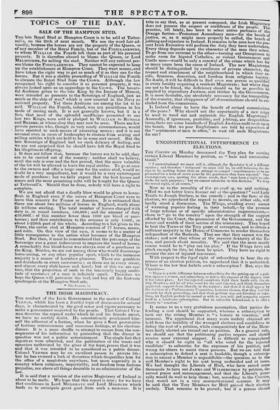TOPICS OF THE DAY.
SALE OF THE HAMPTON STUD.
THE late Royal Stud at Hampton Court is to be sold at Tatter. salt's, on the 25th of next month. We use the word late ad- visedly, because the horses are not the property of the Queen, or of any member of the Royal Family, but of the FITZCLARENCES, to whom WILLIAM the Fourth left them as part of his personal property. It is therefore absurd to 'blame the Queen, or Lord MELBOURNE, for selling the stud. Neither will any rational per- son blame the FITZCLARENCES. They cannot be expected to keep up the establishment at Hampton Court. They want money, and have taken the right way to get as much of it as they can for the horses. But it was a shabby proceeding of WILLIAM the Fourth to alienate the Royal Stud from the Crown. Although the law recognized his right to consider it as personal property, it was always looked upon as an appendage to the Crown. The beauti- ful Arabians given to the late King by the Irnaum of Muscat, were intended as presents to the Sovereign of England, just as much as the ship of war,* which is now counted in the Navy as national property. Yet these Arabians are among the lot to be so!d. 13/musm the Fourth, indeed, was not punctilious in his mode of raising cash. It is not generally known, but it is a fact, that most of the splendid snuffboxes presented to our last two Kings, were sold or pledged by WILLIAM to RUNDLE and BRIDGE, at whose shop they may now be seen. There are few private persons who, though in very needy circumstances, would have resorted to such means of procuring money; and it is not unusual even in cases of bankruptcy to abstain from seizing and selling articles which are held to be in some sort sacred. But the late Sovereign of England had no such delicacy of feeling, and we are not surprised that he should have left the Royal Stud to his illegitimate offspring.
It does not follow that, because the horses are to be sold, they are to be carried out of the country : neither shall we believe, until the sale is over and the fact proved, that the more valuable of the lot will be allowed to leave the royal stables. To go at once to the owners and offer a large sum for the entire stud, would no doubt be a very magnificent, but it would be a very extravagant mode of purchase; but we fully expect that the best horses and mares and the most promising colts will be bought for the Queen at Tattersall's. Should that be done, nobody will have a right to complain.
We are not afraid that a deadly blow would be given to horse- flesh in England even if the racers of Hampton Court were to leave this country for France or America. It is estimated that there are about two millions of horses in England, worth about 25 millions sterling. The total number of horses charged with duty is, in round numbers, 340,000; and the amount of duty 430,000/.: of this number fewer than 1000 are blood or race- horses ; and their contribution to the revenue is only 1500/., or about 1-220th part of the whole. According to a list given in the Times, the entire stud at Hampton consists of 77 horses, mares, and colts. On this view of the ease, it seems to be a matter of little consequence to the nation what becomes of the Hampton Stud. But then, it must be remembered that the patronage of the Sovereign was a great inducement to improve the breed of horses. A remarkably fine blood-horse was always sure of a purchaser in the King. Besides, we are not among those who would discourage horse-racing, or any other popular sport, which to the immense majority is a source of harmless pleasure. There are gamblers and drunkards on every race-course ; so there are in every street, and almost every club-house and hotel ; but of this we are cer- tain, that the proportion of such to the innocently happy multi- tude of spectators of a race is infinitely small. Therefore we hope the Queen will patronize the turf, and buy all the first-rate quadrupeds at the Hampton Stud sale.
• The Iniatun, 74.


























 Previous page
Previous page